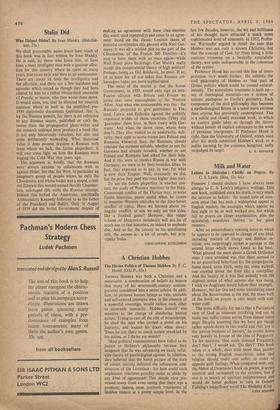A Christian Hobbes
THOMAS HOBBES was both a Christian and a materialist, a combination of beliefs so bizarre that many of his seventeenth-century contem- poraries considered him a secret atheist. In addi- tion, he pictured human beings as vain, unstable and self-centred creatures who, in the absence of a powerful sovereign, would reduce each other to miserable insecurity. Hobbes himself was sensitive to the charge of slandering human nature. Trying to cast off the role of misanthrope, he cited the man who carried a pistol on his journeys, and locked his doors when away: `Does he not there as much accuse mankind by his action, as I do by my words?'
Most political commentators have failed to do justice to Hobbes's philosophy because they imagined that he was advancing an easily refut- able theory of psychological egoism. In addition, they believed that the harsh picture of the state of nature entirely defeated the subsequent co& struction of the Leviathan for how could such unpleasant creatures possibly make or abide by any kind of agreement?. This simple view pre- vented.many from even seeing that there was ,a, problem; indeed, most textbook treatments pf Hobbes remain at a pretty simple level. In the last few decades, however, the wit and brilliance of his thought have attracted a much more sophisticated level of comment. In 1957, Profes- sor Warrender argued in detail the case that Hobbes was not only a sincere Christian, but that the concept of God, far from being a little cautious trimming on a basically naturalistic theory, was quite indispensable to the coherence of the system.
Professor Hood has carried this line of inter- pretation very much further. He exhibits the civil philosophy of Hobbes as 'that part of Divine politics which could be treated natural- istically.' The naturalistic treatment is built up— out of theological materials—on a system of axioms analogous to Euclid's geometry. Each component of the civil philosophy thus becomes a methodological fiction in a sense more extreme than anyone has previously contemplated. This is a subtle and closely reasoned book, in which an austere guide takes us through the theory without benefit of explicit references to the work of previous interpreters. If Professor Hood is right, then the University of Oxford, which soon after his death submitted Hobbes's work to a public burning by the common hangman, sadly


































 Previous page
Previous page